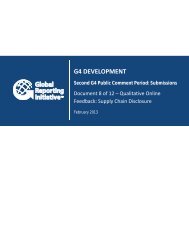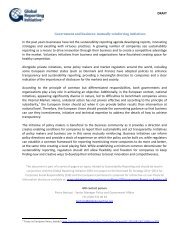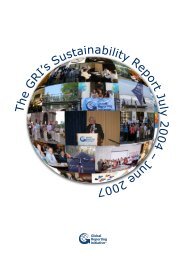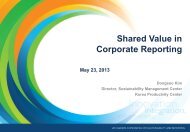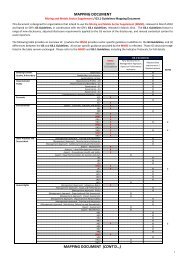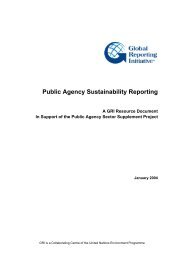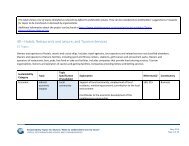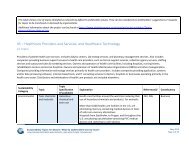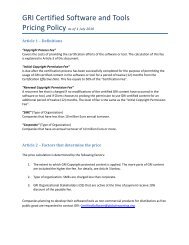CARROTS AND STICKS – PROMOTING ... - Global Reporting Initiative
CARROTS AND STICKS – PROMOTING ... - Global Reporting Initiative
CARROTS AND STICKS – PROMOTING ... - Global Reporting Initiative
You also want an ePaper? Increase the reach of your titles
YUMPU automatically turns print PDFs into web optimized ePapers that Google loves.
Figure 1: Issues addressed in sustainability reports<br />
Since the transition to democracy in 1994 measurement<br />
and reporting on specifically social transformation issues<br />
(e.g. black economic empowerment and employment<br />
equity) have become entrenched in legislation. The fact that<br />
many of South Africa’s largest companies are involved in<br />
mining and other heavy industries has also had a positive<br />
impact on environmental as well as health and safety<br />
reporting practices over the years. Consequently, South<br />
Africa is one of a few developing economies and the only<br />
country in Africa that shows significant reporting activities.<br />
This performance has been acknowledged in international<br />
surveys and is also reflected to some extent by the<br />
leadership positions of South African citizens in initiatives<br />
such as the <strong>Global</strong> <strong>Reporting</strong> <strong>Initiative</strong> and the ISO 26000<br />
process.<br />
Drivers of reporting<br />
The main drivers of sustainability reporting are corporate<br />
governance requirements and the Johannesburg Stock<br />
Exchange (JSE) Socially Responsible Investment Index (SRI<br />
Index). An emerging driver is the new Public Investment<br />
Corporation (PIC) Corporate Governance Rating Matrix, with<br />
a strong emphasis on disclosure of social and environmental<br />
performance. From a governance perspective, the<br />
requirement for sustainability reporting was formalised by<br />
the second King Code on Corporate Governance (2002) that<br />
stated “every company should report at least annually on<br />
the nature and extent of its social, transformation, ethical,<br />
safety, health and environmental management policies and<br />
practices”. The third King Code of Governance Principles for<br />
South Africa (King III), which became effective on 1 March<br />
2010, emphasises the importance of integrated reporting:<br />
“Sustainability reporting and disclosure should be integrated<br />
with the company’s financial reporting . . . [t]he board<br />
should ensure that the positive and negative impacts of the<br />
company’s operations and plans to improve the positives<br />
and eradicate or ameliorate the negatives in the financial<br />
Carrots and Sticks - Promoting Transparency and Sustainability<br />
year ahead are conveyed in<br />
the integrated report (King<br />
III, section 9.2, p 49). In<br />
addition, the JSE SRI Index<br />
encourages companies in<br />
the FTSE/JSE All Share<br />
Index that choose to<br />
participate to report publicly<br />
on sustainability related<br />
issues. The SRI Index was<br />
the first of its kind in an<br />
emerging market, and the<br />
first ever to be launched by<br />
a securities exchange. The<br />
PIC Matrix was developed<br />
in 2008 <strong>–</strong> as the single<br />
biggest investor on the<br />
JSE and one of the largest<br />
investment managers in<br />
Africa, the PIC’s commitment to transparency and disclosure<br />
is likely to have a big impact on reporting practices over the<br />
next few years.<br />
Who reports?<br />
According to the KPMG International Survey of<br />
Corporate Responsibility <strong>Reporting</strong> 2008, 86% of the<br />
top 100 companies in South Africa include some level of<br />
sustainability reporting in their annual reports. Seventeen<br />
percent of companies issued a stand-alone report and 16%<br />
utilized some form of 3rd party comments. Climate change<br />
is a key driver for sustainability reporting, and one in four<br />
companies include reporting on their carbon footprint in their<br />
sustainability report. Unpublished research from 2008 by the<br />
Unit for Corporate Governance in Africa at the University of<br />
Stellenbosch Business School revealed that the top 40 listed<br />
companies report most comprehensively on environmental<br />
management issues, as illustrated in Figure 1.<br />
Conclusion<br />
In theory, South Africa remains in a leading position with<br />
regards to sustainability reporting standards. With a focus<br />
on integrated reporting in King III, which has been presented<br />
within an “apply or explain” environment, the country is<br />
likely to see a further increase in both the quantity and<br />
quality of sustainability reports. With comprehensive<br />
mandatory reporting requirements on both the social and<br />
environmental fronts and a growing interest in socially<br />
responsible investment the country will continue to provide<br />
interesting examples to fuel the “carrots or sticks” debate.<br />
83





